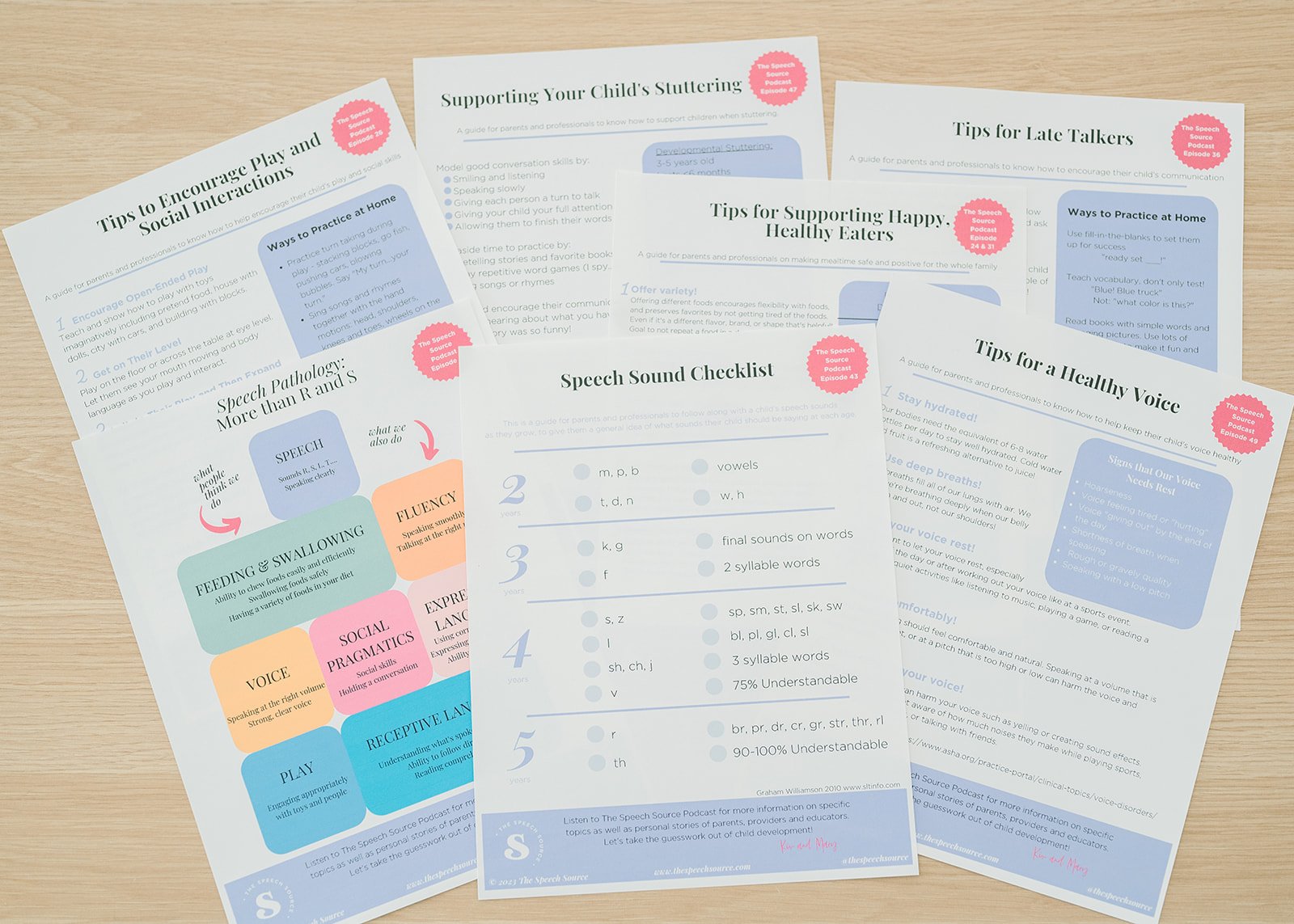Essential Resources for Speech Therapists: Speech, Language, Feeding and Play Handouts
As a speech-language pathologist, having reliable and easy-to-use resources on hand can make all the difference when collaborating with caregivers and teachers. Providing them with educational tools that empower them to support a child’s speech, language, and feeding development is key to ensuring long-term progress. Whether you’re working with children in preschools, daycares, or clinical settings, giving caregivers the right information fosters better communication and collaboration.
In this post, we'll highlight the must-have resources for SLPs, specifically designed for parents and teachers, covering areas such as speech sound development, late talkers, feeding, and play. Each handout in this resource bundle is an invaluable tool for bridging the gap between therapy sessions and daily life, ensuring your clients get the support they need when you're not there.
Why SLPs Need Great Handouts for Caregivers and Teachers
When speech therapy extends beyond the clinic and into the home or classroom, it's crucial to equip caregivers with resources that are easy to understand and implement. By giving parents and teachers clear, actionable tips, you’re enabling them to reinforce what a child learns during therapy. This reinforcement is critical for helping children meet developmental milestones.
Having these ready-to-go resources can also save you time and effort, allowing you to focus more on direct therapy rather than repeatedly explaining concepts to caregivers.
Key Resources for SLPs: A Bundle of Support
Here are the top resources every speech therapist should have in their toolkit to share with parents and teachers:
1. Speech Sound Checklist
This checklist is perfect for tracking the progress of a child’s speech sound development. It's designed to help parents and teachers understand which sounds a child should be producing at each age, and when they might need additional support from a speech therapist. It can serve as an early screening tool, enabling caregivers to spot potential issues before they escalate.
2. Tips for Late Talkers
Parents of late talkers often feel lost about how to encourage speech at home. This handout offers easy-to-follow, practical strategies that help caregivers create language-rich environments. From using simple phrases to setting up communication opportunities, these tips ensure that parents are equipped to support their child’s speech development between therapy sessions.
3. More Than R and S
This resource goes beyond the common perception that speech therapy is only about correcting sounds like "R" and "S." It explains how speech therapy addresses a wide range of areas, including expressive and receptive language, voice quality, feeding, and social interactions. It’s a great handout for parents and teachers who want a broader understanding of what speech therapy can offer.
4. Feeding Tips for Happy, Healthy Eaters
Feeding issues are common in young children, and this resource is invaluable for helping parents navigate mealtime challenges. It offers actionable advice on creating positive feeding environments, encouraging flexibility with food, and recognizing when professional help is needed. This is an excellent guide for parents of picky eaters or children with sensory feeding concerns.
5. Encouraging Play and Social Interaction
Play is a vital part of language development, and this handout helps caregivers foster meaningful play that supports communication skills. Whether it's teaching turn-taking, imitation, or open-ended play, these tips guide parents and teachers on how to turn everyday play into learning opportunities for social and language growth.
The Benefits of Sharing Handouts with Caregivers and Teachers
When you provide caregivers and teachers with professional, well-organized handouts, you’re not just giving them information—you’re giving them confidence. Confidence to know that they can actively support a child's development. These resources can also lead to better communication between SLPs, parents, and teachers, creating a more cohesive approach to therapy.
Here are some key benefits of using handouts in your practice:
Promote Consistency: Caregivers can follow the same strategies you use in therapy sessions, ensuring consistency in the child’s progress.
Increase Awareness: Educating caregivers helps them better understand a child’s needs and when to seek further intervention.
Improve Home Practice: With practical, everyday tips at their fingertips, caregivers can work with their child more effectively at home, reinforcing therapy goals.
Foster Collaboration: Teachers and parents can use the same strategies, ensuring that the child receives support across multiple environments.
Where to Get These Resources
You can find these valuable handouts here. This bundle includes everything you need to support a child’s development in speech, language, feeding, and play. Each resource is paired with a podcast episode from The Speech Source Podcast, providing caregivers with even more detailed guidance on how to use the handouts effectively.
As an SLP, having great resources on hand to give to caregivers and teachers is essential. The handouts included in this bundle not only save you time but also empower parents and educators to take an active role in supporting the child’s progress. By sharing these expert-crafted tools, you create an environment where children can thrive, both in therapy and at home.

